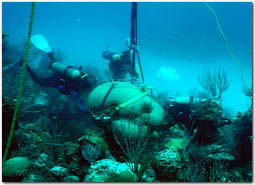 |
Science Highlights > From the Seafloor to Capitol Hill
From the Seafloor to Capitol Hill
 |

Click to enlarge
|
|
WHOI Research Associate Anne Cohen and colleagues hoist a coral from the seafloor near Bermuda to gather evidence of past climate conditions. |
Imagine you are a historian struggling to reconstruct the history of a medieval village. Searching the basement of a remote monastery, you discover a diary that has meticulously recorded daily events over centuries. Anne Cohen, a Research Associate in the Geology and Geophysics Department, is a historian of past climate, and she found her “diary” 15 meters (50 feet) below the sea surface near Bermuda—a venerable 3,300 kilogram (1,500-pound) mushroom-shaped brain coral.
X-ray images of coral slices (right) reveal annual growth bands that indicate age, much like tree rings. Chemical analyses of coral skeletons reveal the temperature and salinity of ocean waters in which the corals grew. By correlating the data, Cohen can chronicle past climate conditions and historic hurricane patterns (which create telltale spikes of rainfall and fresh water) long before ocean-monitoring instruments were invented.
Cohen X-rays coral slices during off-hours at Falmouth Hospital. But with Hanu Singh of the Applied Ocean Physics and Engineering Department, Cohen is developing techniques to get higher resolution and 3-D coral data using the Oceanographic’s new CT scanner. With Boston University colleagues, she is developing ultrasound imaging equipment to analyze living coral underwater, sidestepping expensive hoisting and cutting.
Cohen testified in June 2002 before a US House of Representatives subcommittee on the oceans. With a perspective on North Atlantic climate changes reaching back before the American Revolution, she reported an unusually rapid rise of more than 1°C (1.8°F) in average wintertime Atlantic Ocean temperatures since 1970. This work was funded by the National Oceanic and Atmospheric Administration and by the WHOI Ocean and Climate Change Institute.
|
